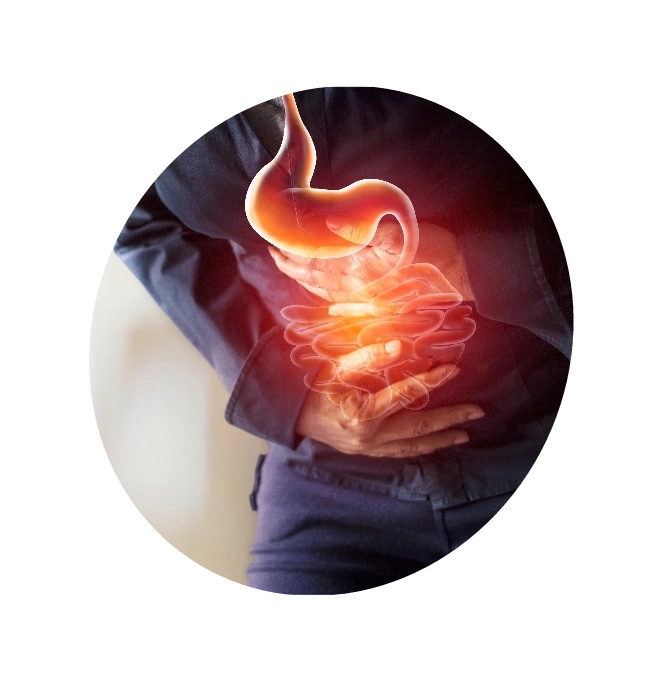What Is Irritable Bowel Syndrome?
Irritable bowel syndrome (IBS) is one of the most common disorders that physicians see. Yet it’s also one that many people aren’t comfortable talking about. IBS is characterized by abdominal pain or cramping and changes in bowel function — including bloating, gas, diarrhea, and constipation — problems most people don’t like to discuss. What’s more, for many years IBS was considered a psychological rather than a physical problem.
Up to one in five American adults has irritable bowel syndrome. The disorder accounts for more than one out of every 10 doctor visits. For most people, signs, and symptoms of irritable bowel disease are mild. The majority of people suffering with IBS have mild-to-moderate symptoms; severe cases are rare.
Fortunately, unlike more serious intestinal diseases such as ulcerative colitis and Crohn’s disease, IBS doesn’t cause inflammation or changes in bowel tissue or increase your risk of colorectal cancer. In many cases, you can control IBS by managing your diet, lifestyle, and stress.
What Are the Signs and Symptoms of Irritable Bowel Syndrome?
Signs and symptoms of IBS vary widely from one person to another and often occur with many other diseases. Among the most common are:
- Abdominal pain or cramping
- A bloated feeling
- Gas (flatulence)
- Diarrhea or constipation — people with IBS may experience alternating bouts of constipation and diarrhea
- Mucus in the stool
Like many people, you may have only mild signs and symptoms of IBS. Sometimes these problems can be disabling, however. In some cases, you may have severe signs and symptoms that don’t respond well to medical treatment.
For most people, IBS is a chronic health condition, although there will likely be times when signs and symptoms are worse and times when they improve or even disappear completely.
What Are the Causes of Irritable Bowel Syndrome?
Muscular walls line the interior of the intestines, with regular contractions and relaxations as food passes from the stomach to the rectum via the intestinal tract. Typically, these muscles move in a patterned and synchronized rhythm, contracting and expanding in succession. But if you have IBS, the contractions are stronger and last longer than normal. Food is forced through your intestines more quickly, causing gas, bloating, and diarrhea. In some cases, however, the opposite occurs. Food moves through the digestive tract at a slower rate, stools can become harder and drier..
No one knows exactly what causes IBS. Certain experts suggest that IBS is the result of alterations in the nerves that control sensations and muscular contractions inside the intestine. Others believe the central nervous system may affect the colon. And because women are two to three times more likely than men to have IBS, researchers believe that hormonal changes also play a role. It is not uncommon for women to report increases in their signs and symptoms during or around their menstrual period.
For reasons that still aren’t clear, if you have IBS you probably react strongly to stimuli that don’t bother other people. People with IBS can experience a wide variety of triggers, from physical discomfort or pressure on the intestines to certain foods, medications and even emotions. For instance, chocolate, milk, and alcohol might cause constipation or diarrhea. And the least bit of stress might send your colon into spasms.
If you’re like most people with IBS, you probably find that your signs and symptoms are worse or more frequent during stressful events, such as a change in your daily routine or family arguments. But while stress may aggravate symptoms, it doesn’t cause them.
Diarrhea (Gastroenteritis) Can Trigger IBS
IBS symptoms can sometimes be caused by other illnesses, like when a person experiences an outbreak of gastroenteritis. Antibiotic use also may be a factor because antibiotics disrupt the normal bacterial flora living in your bowel. The overuse of laxatives and some antidiarrheal medications could be a factor in the issue too.
If you experience cramping and bloating mainly after eating dairy products or sugar-free gum or candies, the problem may not be irritable bowel syndrome. Alternatively, your system might not be able to digest the sugar (lactose) from dairy items or the sugar substitute sorbitol.
What Are the Risk Factors of Irritable Bowel Syndrome?
Many people have occasional symptoms of IBS, but you’re more likely to have IBS if you’re young and female. IBS typically begins around age 20. Overall, two to three times as many women as men have the condition.
Screening and Diagnosing Irritable Bowel Syndrome
A diagnosis of IBS depends largely on a complete medical history and physical exam. Your doctor may also recommend conducting several tests, including stool studies to check for infection or malabsorption problems. He or she may perform a flexible sigmoidoscopy — a test that examines the lower part of the colon (sigmoid) with a flexible, lighted tube (sigmoidoscope).
Complications
Both diarrhea and constipation can aggravate hemorrhoids. In addition, signs and symptoms of IBS can interfere with your work, your relationships with friends and family, and your ability to live your life to the fullest. At times, you may feel discouraged or depressed.
How Is Irritable Bowel Disorder Treated?
Because it’s still not clear what causes IBS, treatment focuses on the relief of symptoms so that you can live your life as fully and normally as possible.
In most cases, you can successfully control mild symptoms of IBS by learning to manage stress and making changes in your diet and lifestyle. But if your problems are moderate or severe, you may need more help than lifestyle changes alone can offer.
For moderate IBS, your doctor may suggest taking fiber supplements such as psyllium (Metamucil) or methylcellulose (Citrucel) with fluids, to help control constipation and over-the-counter medications such as loperamide (Imodium) to help control diarrhea. In some cases, you may need drugs that affect certain activities of the nervous system (anticholinergics) to relieve painful bowel spasms. If that is the case, it is essential to make a follow-up visit to your doctor.
Should you experience pain and depression, your medical practitioner could suggest the use of tricyclic antidepressant or selective serotonin reuptake inhibitors (SSRI). Medications for depression can be effective in helping to decrease symptoms and also block the hormones that control intestinal movement. For diarrhea and abdominal pain, your doctor may suggest tricyclic antidepressants such as imipramine (Tofranil) and amitriptyline (Elavil). Taking these drugs may lead to drowsiness and constipation as side effects.
Selective serotonin reuptake inhibitors such as fluoxetine (Prozac, Sarafem) or paroxetine (Paxil) may be helpful if you’re depressed and have pain and constipation. If these medications don’t work, you may have better results from counseling. If you have severe IBS, it’s important to receive ongoing treatment and support from your physician.
(FDA) Approved Lotronex Specifically for Women
In November 2000, the Food and Drug Administration (FDA) approved the first medication specifically for the treatment of moderate to severe symptoms of IBS in women. Alosetron is a nerve receptor antagonist that’s supposed to relax the colon and slow the movement of waste through the lower bowel. But the drug was pulled from the market just nine months after its approval when it was linked to at least four deaths and severe side effects in 197 people.
In June 2002, the FDA took the unprecedented step of allowing Lotronex to be sold again — with a number of restrictions. The drug can be prescribed only by doctors enrolled in a special program and is intended for severe cases that haven’t responded to other treatments. Lotronex is not approved for use by men or for women who don’t have the diarrhea-predominant form of IBS.
For women who have IBS with constipation, the FDA approved the medication tegaserod (Zelnorm) in July 2002. It’s approved only for short-term use in women and has not been approved for use in men. Tegaserod imitates the action of the neurotransmitter serotonin and helps to coordinate the nerves and muscles in the intestine.
Coping skills
Living with IBS presents daily challenges. It may be painful or embarrassing and can seriously affect the quality of your life. These suggestions may help you cope more easily:
Learn as Much About Ibs as You Can
Talk to your doctor, look for information on the Internet, and read books and pamphlets. Being informed about your condition can help you take better charge of it.
Identify the Factors That Trigger Ibs
This is a key step both in managing your condition and helping you feel you have control of your life.
Seek Out Others with Ibs
Talking to people who know what you’re going through can be reassuring. Chatting online or attending IBS support groups at your local community. Your doctor may be able to refer you to a support group, or you may find one in your local paper or on Internet sites.
Don’t Hesitate to Seek Counseling
Behavioral medicine experts can assist you in comprehending and coping with the impact of stress

